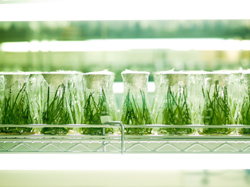Programming the death of a cell
Programmed cell death (PCD) is a critical developmental phenomenon necessary for controlled, timely development and homeostasis in multicellular organisms. Using micro-spectroscopic techniques, the European project INSIGHT INSIDE investigated molecular interactions involving relevant signalling molecules. The molecular basis of PCD could then be elucidated by determining the signal transductions leading to biochemical cascades and the final apoptosis. The role of R proteins was specifically investigated by Netherlands based project partners at Wageningen University. Many plant disease resistance (R) genes encode proteins with three functionally important regions. The terminal domains are coiled coil (CC) and a leucine rich repeat (LRR). Centrally there is a nucleotide-binding site (NBS). These CC-NBS-LRR proteins recognise pathogen derived products and initiate a resistance response that often includes a type of cell death known as the hypersensitive response (HR). On the premise then that these R proteins act as molecular switches using the NBS, the researchers aimed to further elucidate these molecular cascades. One other feature of note is that the R proteins are translocated directly to the nucleus. Here, they are strategically placed within the cell to interact directly with transcriptional factors. The scientists found that the LRR region is responsible for the recognition of a pathogen effector which triggers intramolecular autoinhibition. This then makes way for the binding of further signalling molecules or oligomerisation. Finally, anti-pathogenic compounds are produced followed by a reactive oxygen burst and then the critical end-point, cell death. To speed up the screening for the protein-protein interactions involved in the cascades, the same project partners merged the library-versus-library technique with phage display. Moreover, the use of fluorescent phages enabled the identification of protein interactions in real time. The data from this research has been incorporated into plant breeding programmes to obtain resistance against pathogens and parasites. Knowledge of molecular pathways also provides unlimited scope for the development of specifically tailored drugs for diseases and cancers.







